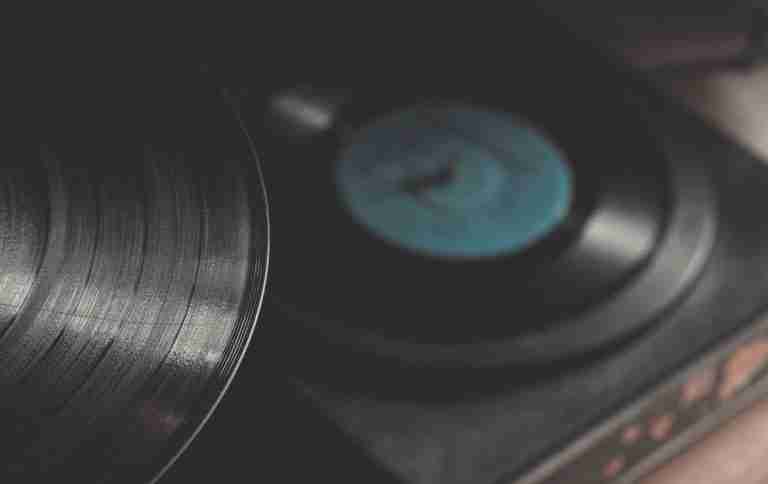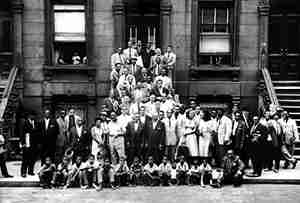Every day we receive countless variations of what, why, where, who, when, and how to transcribe questions in our inbox. Should I transcribe lines or whole solos? Do I need to transcribe from the recording or can I just use a transcription book? Who should I transcribe? Do I have to transcribe Charlie Parker? Can I transcribe modern players? Is it okay to slow down the music I’m transcribing? What’s the process of transcribing? Did the great players of this music transcribe?
All of these and the others that come up are all great questions because they deal with something that is so necessary to learn how to play jazz and improvise the way you want: transcribing.
What should I transcribe?
What should I transcribe? Should I start somewhere in particular or just jump in head first? Should I do a whole solo or single lines?
Knowing what to transcribe can be difficult. There’s so much out there and you could literally do any of it. The best place to start is with the basic units and forms of jazz. So what does this mean? It means you start with something as simple as a major chord. Transcribe one line over a major chord and you’re on your way; acquiring useful language over these building blocks is essential.
The basic units and forms I’m talking about are: single chords (major, minor, dominant, half-diminished, etc.), ii Vs, minor ii Vs, blues, rhythm changes, and super common standards.
Does this mean you can’t transcribe Coltrane on Spiritual?
Absolutely not! It means that starting with common units and forms that frequently occur in jazz will help build your foundation. Many people do in fact jump straight to more esoteric music like that of Trane on Spiritual.
They think they’re being hip or cool, but they’re really just being lazy and limiting their ability. Focus on the common forms and you’ll build the necessary foundation that the jazz language requires.
Moreover, there seems to be confusion over whether you should transcribe entire solos or just lines. I know great players that say they have done exclusively one or the other and I know great players that have done both.
You should do what works best for you. For me, when I’m really disorganized and down on my playing, it helps to have a solid project that I can focus on, a single solo that I can return to over a period of days, weeks, or even months.
I try to pick a solo that I love, over a specific tune that I want to learn. That way, I learn a lot just from working a little bit on the solo each day; through the process, I not only transcribe the solo and gain all the language, but I get the added benefit of learning a new tune on an intimate level. When you transcribe a solo in this way, you can’t help but learn the chord changes and the melody. Those are great byproducts of transcribing a solo.
However, you do not need to feel obligated to transcribe a whole solo. A few choruses, one chorus, or even eight bars is sufficient. It all depends on what you want to learn, what catches your ear, and what you do with the material you transcribe.
Although I love zeroing in on a solo because it helps me focus and structure my practice especially in those overly self-critical times, transcribing small excerpts or short lines has just as much benefit.
Grabbing a single line allows you to get to the development phase of building on the line much more quickly than waiting until you transcribe a whole solo. Sometimes people transcribe a whole solo and never even get around to developing any of the material they’ve learned beyond how it was originally played. I know that I have at least five solos that I’ve learned note-for-note that I still haven’t really pulled apart and made the various pieces my own.
Do not feel pressured to transcribe whole solos or just lines. Mix it up and learn as much as you can. No matter what you transcribe, as long as you truly love it and absorb something from the performer, you will improve.
Why should I transcribe?
Why should I transcribe? Isn’t it the same if I learn a solo from a transcription book? The legends of this music didn’t transcribe, did they? If I want my own style, why would I copy someone else?
You should transcribe to learn jazz language, to learn jazz phrasing, to learn your instrument, to be influenced by the players you love, to learn tunes, to learn concepts that you abstract and apply. The process of transcribing, in my experience and many others, is pretty much the only way to learn these things on a deep level.
Can you play jazz without transcribing? You can, but you’ll constantly wonder why you’re not getting where you want to. Even famous players that say they didn’t transcribe, in many cases, actually did.
For example, there may be an interview of someone saying, “I never transcribed,” and then later in the interview the musician goes on to say how they played along with all the recordings of their heroes copying and learning as much as they could. Hmmm, sure sounds like transcribing to me.
Over the years, I’ve seen this a number of times and it misleads people that are trying to improve because they think, “Well so-and-so didn’t transcribe and I love his playing, so I shouldn’t transcribe either.”
Using what you read about other people’s habits to justify your own is a slippery slope. As in the previously mentioned example, the musician simply defined transcribing as something different than how we think about it. It’s not his fault. In his mind, he didn’t transcribe because he’s thinking, “I never wrote anything down,” but unfortunately, a reader’s takeaway from such an interview can end up keeping them from learning from their heroes for their entire life.
Yes, the legends of this music and your favorite players transcribed. You can argue about it all day to justify your own decision not to transcribe, but the reality is, to learn the subtleties of jazz, you have to listen and imitate the nuances you hear.
Whether you write what you transcribe down and/or analyze is your decision; while beneficial in their own way, these activities are not the meat of transcribing. Many great players never wrote anything down, others wrote down everything. The only thing to watch out for is if you do write things down, do not use what you write down as a crutch to play what you transcribe.
The best way to make sure you don’t use anything written as a crutch: wait until you’re done transcribing your solo, chorus, or line with your instrument before you write anything down. In other words, you should be learning everything on your instrument before you notate it, if you choose to do so.
And while we’re talking about writing things down that you transcribe, let’s talk about transcription books. Oh yes, a mere $17.99 and you’ve got Charlie Parker’s whole life on a platter, ready for your consumption. Unfortunately, you’re about to dive into a watered down approximation of the real thing and not even know it.
Transcription books are a shortcut. Feel free to use them, but know you’re cutting corners and you will not get what you came for. You may pick up a line here or there. You may even learn a whole solo, but will it be there forever? Will it be imprinted on your soul? Will you conceptualize what you’re learning in an applicable way, a way that you can build upon and develop?
You are significantly limiting yourself as a player by using transcription books, so if you’re using them right now it’s okay, but over time, ween yourself off them, start doing your own homework and thank me later.
So why should you transcribe if your goal is to ultimately create your own distinctive voice? It seems logical not to copy people in an effort to keep your identity. The flaw in that line of thinking: you have no identity until you listen to and imitate people.
Jazz is a language and you don’t come from the factory speaking any particular language. You have to be exposed to the language on many different levels to absorb it and to start speaking it. By surrounding yourself by the people that you want to speak like, you gradually speak more like them. After a while, you refine how you want to speak based upon your individual taste.
Where should I transcribe?
Where should I transcribe? I can practice and learn from a recording anywhere, right?
Indeed, you can practice and transcribe anywhere, but creating the ideal practice space is best. Create a focused environment where you can study and enjoy where it feels natural to learn and explore. Get away from everyone and everything. Isolate yourself and immerse yourself in what you’re studying.
Within your environment it’s great to have a computer with external speakers, a transcribing program, and a clear idea of what you want to practice so you don’t end up wasting your precious time.
Who should I transcribe?
Who should I transcribe? Should I start with Bird? Can I transcribe modern players?
You needn’t transcribe the people that you think you should transcribe. Everyone is always saying, “You have to transcribe this guy, and then this guy, and then move on to this guy…”
Transcribe the people that you want to sound like, the people you listen to all the time. Hate Coltrane and never listen to him? Then don’t transcribe him. You do not need to be influenced by everyone.
There’s no reason you should study someone’s playing if you don’t want to sound like them. That’s a large part of crafting your unique voice; you study the people that move you and therefore you get closer to becoming the things you do like and farther away from the things you don’t like.
However, be aware of the other side of the coin. You may haven’t learned to like a particular player yet and are therefore missing out on a ton you could learn from them. But, just keep listening. Perhaps one day your ear changes and you suddenly love Trane whereas previously you didn’t get it. Then it makes sense to transcribe him.
Now it does make sense to begin by transcribing the legends of this music, the people that created this music. There’s a plethora of greats on your instrument that really defined its voice. You most likely already know who these people are and listen to them daily. These are the people you should transcribe.
A lot of the time, students want to jump in and transcribe modern players right away. Why should you steer clear of this? Well, it’s difficult to convince anyone not to do this until years after they do.
From my own experience, I copied some modern players before I began to learn from people like Coltrane, Sonny Rollins, Bill Evans, and Freddie Hubbard. I was more concerned with what Kenny Garrett, Michael Brecker, and Joshua Redman were up to.
And, it was overtly clear in my playing. When I realized that my ultimate goal was not to be a cheap approximation of some modern player, I decided to begin studying the people they studied. I soon realized where many of their ideas came from and how they chose to develop concepts to make them their own. I also realized that to create my own voice, I would have to follow a similar process and develop ideas the way I wanted to.
Can you not transcribe modern players? Of course you can. Often, there’s plenty to learn from a single line from many modern players. Just be aware that it’s easy to get caught in a trap and be the one-millionth-and-one person to be a scanned version, of a photocopied piece of paper, of a carbon copy of a faint resemblance to Michael Brecker.
When should I transcribe?
When should I transcribe? I’m so busy practicing other things, when will I find the time?
Now. Not tomorrow. Not when you get time. Now. Seriously, stop reading and go do it now.
Quit making excuses, that you have so many other things to practice, or don’t know where to start. You know where to start and you know that by transcribing you’re working on ear training, technique, improv concepts, jazz language, time, phrasing, sound, intonation, just to name a few…
How should I transcribe?
How should I transcribe? Is there a specific process I should use?
Yes, if you’ve been reading Jazzadvice for a while, you know we write about getting started with transcription all over the place, so go get started! As you’ll read throughout the site, it’s okay to slow down and loop sections in a program like Transcribe. No need to be macho.
But besides the actual process, how do you want to transcribe? You want to transcribe with passion, with deep interest, with intensity, and with a mad sense of curiosity.
Everything you ever wanted to know about transcribing
Transcribing anything of your favorite players, the players you listen to everyday, is the single largest step toward learning the fundamentals of jazz improvisation. Is it the end all be all? No.
You need to take everything you transcribe beyond where you find it and apply the jazz language that you transcribe and develop it in your own unique way.
Explore. Be inspired. Use it as a starting point. You’re not only learning the way your heroes played, you’re developing on what they did.
Stop imagining that transcribing is some esoteric complex process. It’s not. It’s as easy and simple as can be. Find something you love that you wish you sounded like, start copying, and then take what you learn to the next level by understanding the underlying logic behind it.
Treat transcribing as a process of exploration, an adventure into the unknown, like you’re unraveling the mysteries of the universe because in a sense, you are.












